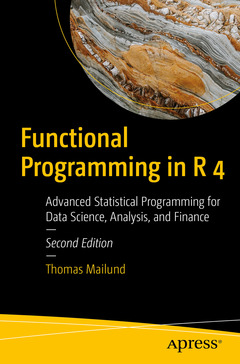Functional Programming in R 4 (2nd Ed., 2nd ed.) Advanced Statistical Programming for Data Science, Analysis, and Finance
Auteur : Mailund Thomas

- Write functions in R 4, including infix operators and replacement functions
- Create higher order functions
- Pass functions to other functions and start using functions as data you can manipulate
- Use Filer, Map and Reduce functions to express the intent behind code clearly and safely
- Build new functions from existing functions without necessarily writing any new functions, using point-free programming
- Create functions that carry data along with them
Thomas Mailund is Senior Software Architect at Kvantify, a quantum computing company from Denmark. He has a background in math and computer science. He now works on developing algorithms for computational problems applicable for quantum computing. He previously worked at the Bioinformatics Research Centre, Aarhus University, on genetics and evolutionary studies, particularly comparative genomics, speciation, and gene flow between emerging species. He has published Beginning Data Science in R with Apress, as well as other books out there.
A unique book on learning and using functional programming in R
Author is an expert at using and programming with R
R is a popular open source programming language for statistical analysis and data science
Date de parution : 06-2023
Ouvrage de 158 p.
15.5x23.5 cm
Mots-clés :
functional; R; programming; language; CS; computer; code; software



